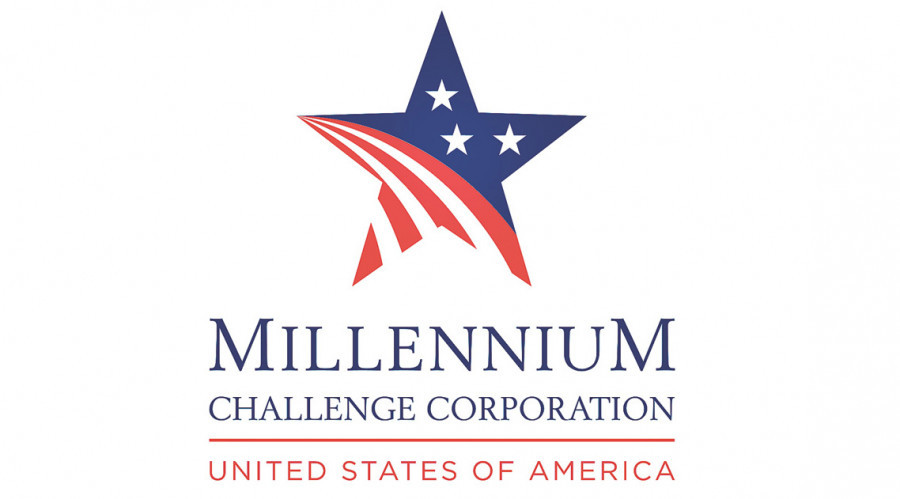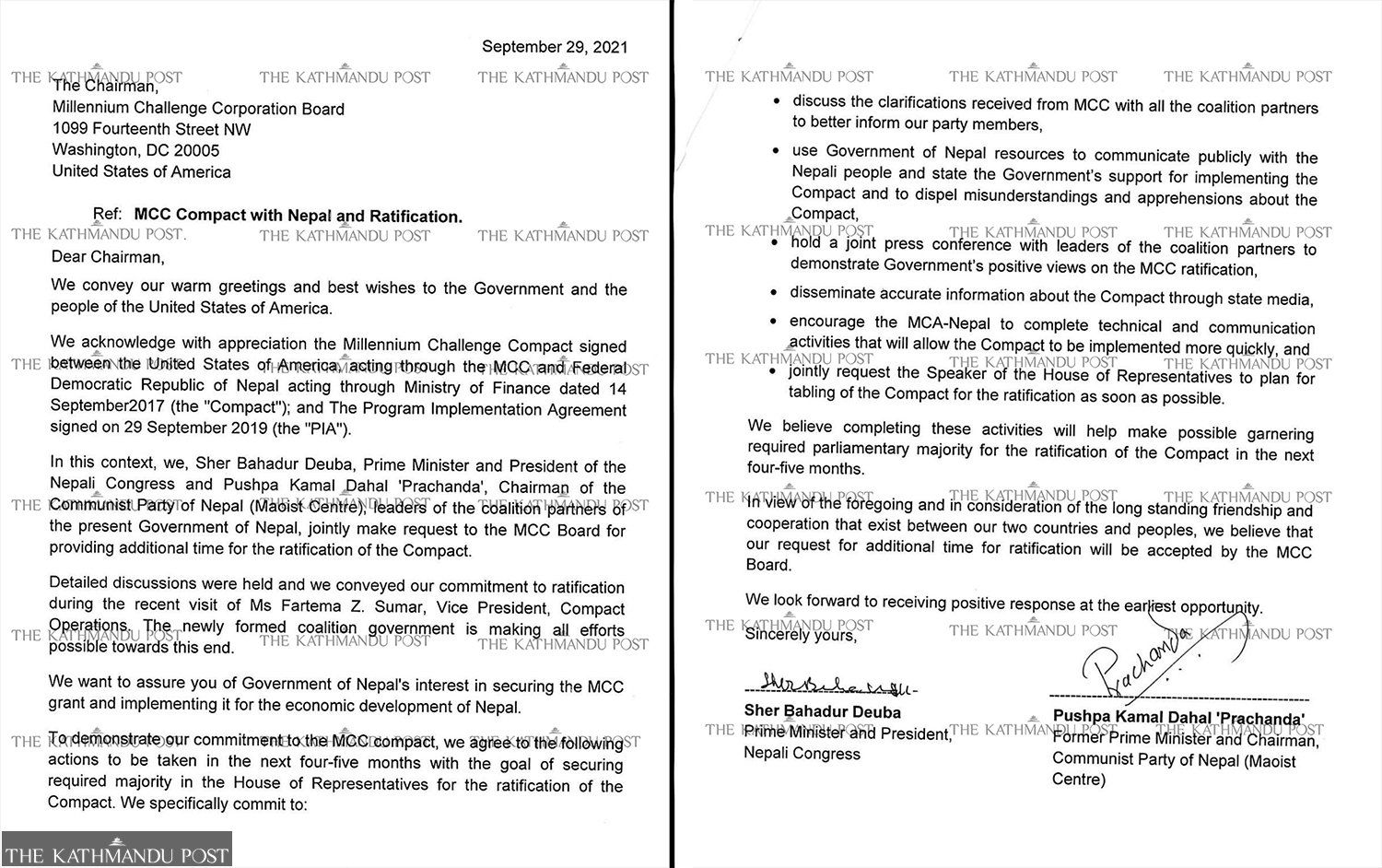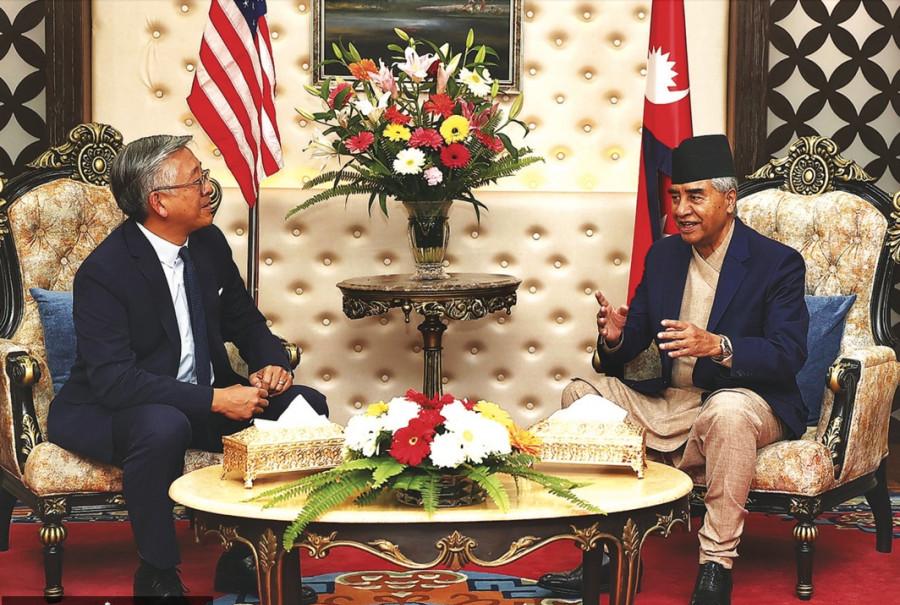National
Top American official says US will review Nepal ties if MCC compact is not ratified
Donald Lu from the State Department in phone calls to Deuba, Oli and Dahal expresses deep concerns over delay in ratifying the $500 million grant.
Anil Giri
Washington has conveyed to Kathmandu that it would be forced to review its ties with Nepal if the Nepali political leadership fails to keep up with their commitments on the $500 million Millennium Challenge Corporation grant signed nearly five years ago.
In separate telephone conversations with Prime Minister Sher Bahadur Deuba, CPN-UML chair KP Sharma Oli and Maoist Centre chair Pushpa Kamal Dahal on Thursday, US Assistant Secretary of State Donald Lu said that Washington will review its relations with Nepal in the event of its failure to ratify the MCC compact from Parliament by February 28, according to multiple officials familiar with the conversation.

This is the first such strongly worded message to Nepali political leadership from Washington since Nepal and the United States established bilateral ties in 1947.
Leaders close to Deuba and Oli as well as diplomatic sources confirmed to the Post that Lu made separate telephone calls to the three top leaders on Thursday morning to communicate the US government’s position on MCC ratification and possible ramifications absent ratification by February 28.
The phone calls follow an interview by MCC vice president Fatema Z Sumar on Friday in which she said that the February 28 deadline was set by Prime Minister Deuba and Maoist Centre chair Dahal through a letter the two leaders dispatched to the MCC Board chairman, US Secretary of State Antony Blinken, on September 29.
“Secretary of State Lu conveyed to Chairman Oli that the US will be forced to review its bilateral ties with Nepal if the MCC is not ratified by the given deadline set by Deuba and Dahal,” Rajan Bhattarai, the head of the UML’s Foreign Affairs Department, told the Post while confirming the conversation.
In response, Oli, according to Bhattarai, said that the US has been one of the biggest assistance partners of Nepal in various sectors for decades.
“The US has been Nepal’s longtime development partner and it helped us secure the UN membership, so we cannot think about damaging our relations over a developmental project like MCC,” Bhattarai quoted Oli as saying. “As far as our party, the UML, is concerned, our position on MCC remains the same and we are waiting for the present ruling alliance to make the move. Once it is tabled in the House, we will make our position public because we are not in a position to take a decision as an opposition party.”
Even though Oli was apparently keen on getting the MCC compact ratified by Parliament when he was prime minister, his party has taken a different approach since Deuba took over on July 13 last year. During a meeting with Sumar in Kathmandu in September last year also, Oli had conveyed that it was up to the ruling alliance to make a position on the US compact rather than the opposition party.

While anti-MCC views have deeply penetrated the Nepali society, the Maoist Centre has remained the biggest opponent of the US grant. Maoist chair Dahal had his political dossier endorsed from his party convention in December last year, in which he said the American compact cannot be ratified without amendments.
Dahal’s duplicity was exposed when his and Deuba’s letter to the MCC headquarters and an MCC response made it to the public domain. Deuba and Dahal in their joint letter to the MCC had sought four-five months to build consensus on the compact.

During her three-day stay in Kathmandu in September, Sumar had met with a host of political leaders, including Prime Minister Deuba, Dahal and Oli.
Two months after Sumar’s visit, Lu had arrived in Kathmandu. He too had communicated to top Nepali political leadership that it is up to Nepal to accept or reject the MCC compact while he urged them to pursue a “democratic and consultative approach” to endorse the $500 million grant from Parliament.

“If Nepal does not take the grant, we will spend the money in some other country. And, it’s okay with us if Nepal does not endorse it,” Lu told reporters in Kathmandu. “[Whatever is the decision] it is the sovereign decision of Nepal. We have urged you to find out what you want to do with the MCC.”
The MCC compact was registered in Parliament on July 15, 2019, almost two years after Nepal signed the agreement. It, however, started to become a political issue from January 2020 when Dahal, who co-chaired with Oli the now invalidated Nepal Communist Party (NCP), and some other leaders sowed suspicions about the US grant which is meant for developing electricity transmission lines and improving roads in Nepal.
Amid delays, Mahmoud Bah, the MCC acting CEO, told the Post in an interview in January that the US cannot keep the grant on hold indefinitely.
A leader close to Deuba said that the prime minister communicated to Lu that he was trying his best to persuade his alliance partners to ratify the MCC compact.
“You are fully aware of my efforts to ratify the compact from the House,” the leader quoted Deuba as telling Lu. “I am fully aware of the consequences if MCC is withdrawn from Nepal.”
The leader said the prime minister has also requested Washington not to take any harsh decision that could hamper the longstanding relations between Nepal and the US.
Diplomatic and political sources told the Post that Lu communicated basically five messages to Deuba, Oli and Dahal surrounding the MCC compact during his telephonic conversations with them.

One is that the MCC agreement should be put to vote in Parliament and just tabling it will not be enough.
“We are okay if the sovereign Parliament rejects the MCC compact but it should be put to vote,” Lu told Deuba, Oli and Dahal, according to the sources. “We respect and honour the decision of the sovereign Parliament of Nepal and let the elected officials take the decision.”
Second point that Lu conveyed is there is no room for amendments to the MCC compact because a lot of discussions have already taken place in the past. In its every communication, including the last interview on Friday with Sumar, MCC has ruled out amendments.
According to the sources, the third point from Lu was that besides a review of the US-Nepal ties, there could be cuts on not only the US aid and assistance but other support and investment that Nepal is receiving from various bilateral and multilateral agencies.
Nepali officials say the latest communication from the top US official is in line with what the US has been saying in various letters and virtual meetings that Nepal could lose bilateral and multilateral aid, assistance and even private investment if Nepal fails to ratify the MCC.

“The US has been the biggest bilateral donor of Nepal for decades and if the US decides to review its ties with Nepal, its direct impact will be on our economic sector,” said a senior Finance Ministry official. “The US has a big say in various bilateral and multilateral financial institutions, including the World Bank and the International Monetary Fund. The US has significant voting clout in big lending agencies agencies like the World Bank, the IMF, the IFC, Extended Credit Facility of the IMF and others.
A diplomatic source echoed it.
“Investment could be affected as Nepal is reneging on an agreement it signed, so I think there would be a question of trust if I were an investor,” the source told the Post on condition of anonymity.
The top disbursing bilateral development partners of Nepal in descending order are the United States, the United Kingdom, India, China and Japan, according to the latest Finance Ministry report of 2020.
The World Bank has been the second highest disbursing development partner with around 23 percent of its share in all Overseas Development Assistance (ODA) disbursements to Nepal. The Asian Development Bank was the highest disbursing development partner contributing to 30.5 percent of all ODA disbursements in 2019-20.
“Multilateral development partners contributed 71 percent of all ODA disbursements. The top disbursing multilateral partners in 2019-20 were the Asian Development Bank followed by the World Bank, the IMF, the European Union and the UN. Bilateral development partners contributed 29 percent of all ODA disbursements,” the Finance Ministry report said.
According to two additional government and party sources, Lu, on his part, on Thursday communicated to the Nepali leaders that the US has been providing more assistance to Nepal directly than through MCC or USAID or the World Bank and other multilateral lending agencies.
So MCC itself is not a big issue for the US, said Lu, but the way disinformation against the United States and the MCC has been circulated in various social media platforms is quite concerning, according to the sources.
“Since MCC is purely a development assistance to Nepal, it is not linked to any military or security elements as some sections in Nepal have hyped. We have clarified this point several times in the past too.”

Lu is learnt to have also conveyed the US concern about increasing cases of corruption in Nepal and abuse of human rights.
“And at some point, the US government will take a very tough stand on these two issues,” Lu conveyed to the leaders. “Manipulation of MCC by some individuals has made us take a tough stand and position on human rights abusers and those involved in systematic corruption in Nepal.”
Bhattarai, the UML leader who also served as foreign relations adviser to Oli during his tenure as prime minister, said if the US government decides to review its ties with Nepal, this will have serious repercussions.
“Such a move will hugely tarnish the image of our country. Due to the immature and childish acts of some of our leaders, Nepal is in serious trouble. Some of our leaders made MCC a geopolitical tool which will be counterproductive to Nepal,” Bhattarai told the Post.
“We will be known as unreliable and untrustworthy. Some of our leaders made foreign policy a joke and used it as a personal tool for their personal interests.”
Minister for Communication and Information Technology Gyanendra Bahadur Karki, however, told the Post that he was not aware of the content of the conversation between Deuba and Lu.
“I have heard of a telephonic conversation between the prime minister and the US official,” said Karki, “but I do not know the content of their discussion.”
An aide to Dahal said that the Maoist Centre’s position remains unchanged to date.
“If there’s an agreement in the ruling alliance, MCC may get through the House. Our position is the same. It cannot be ratified in its existing form,” the Dahal aide told the Post. “Our chairman has communicated our position both to the prime minister and the US official.”
Narayan Kaji Shrestha, head of Maoist Centre’s foreign relations department, told the Post that Lu reiterated the US position on MCC and what the Americans have been telling the Nepali leadership in the past.
“Lu said that the US has taken the controversy surrounding MCC in Nepal seriously. He conveyed to our chairman that the compact should be ratified by the House without any further delay and that there is no room for amendments,” said Shrestha.
In response, according to Shrestha, Dahal said that they are trying their best to reach consensus on MCC and talks are going on at different levels in the ruling alliance on how to sort out the outstanding issues.
“The message is that the US is not going to give any further extension,” said Shrestha.




 19.12°C Kathmandu
19.12°C Kathmandu














